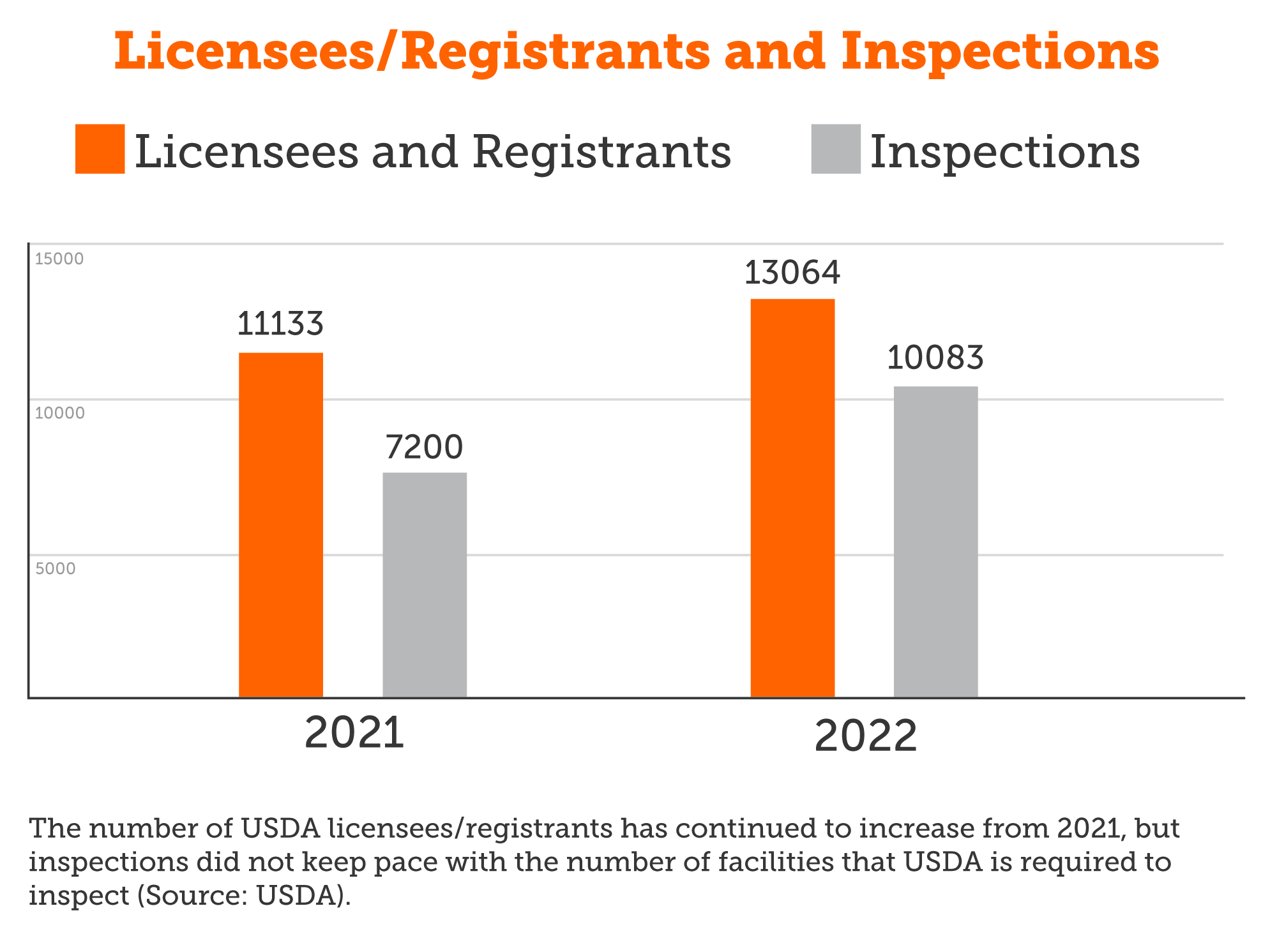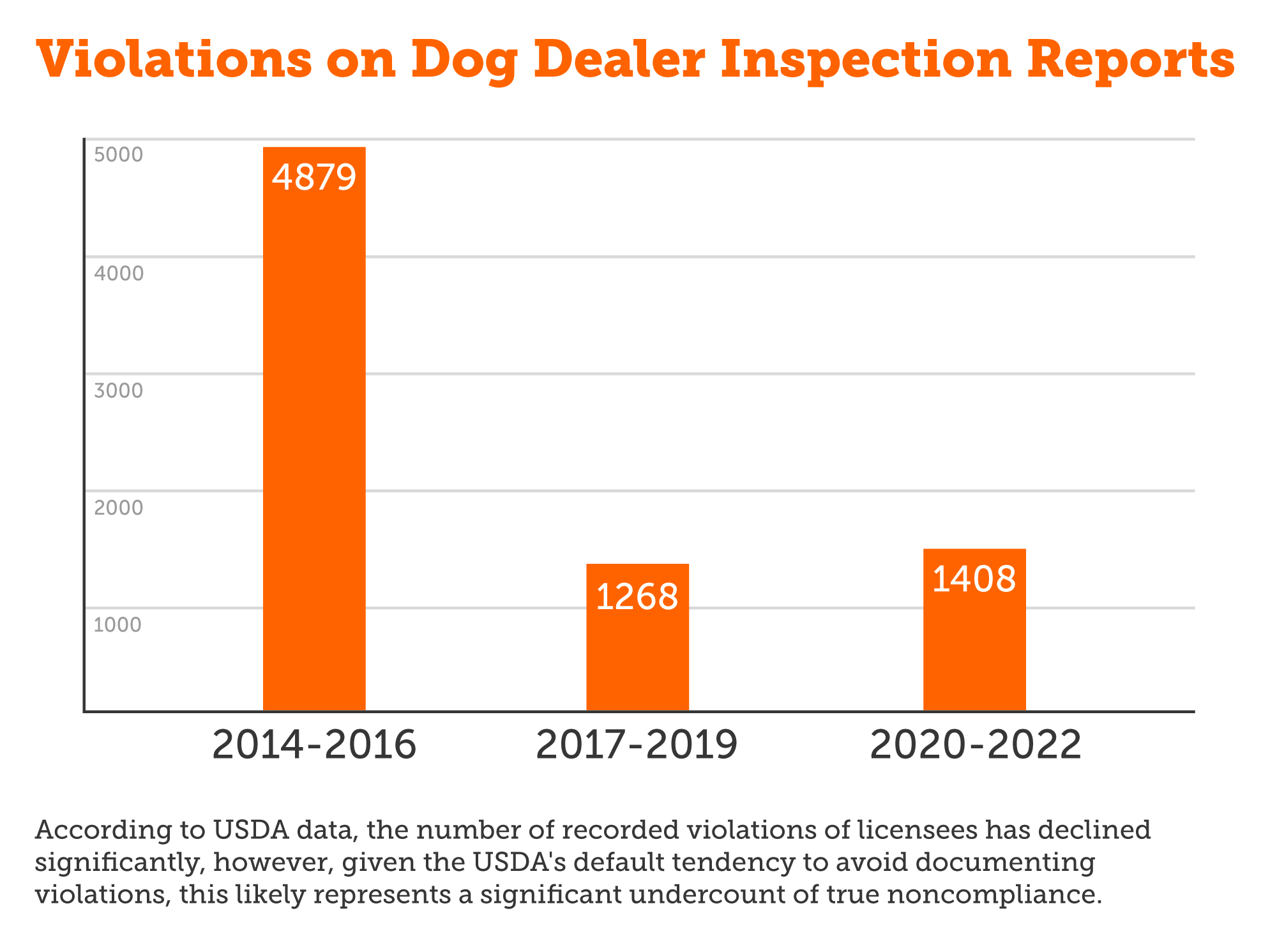
USDA Enforcement: Fiscal Year 2022
USDA policies prevent enforcement against Animal Welfare Act violations.
- The USDA isn’t keeping up with inspections, yet continues to issue commercial breeding licenses.
- Violations are not reported because of the agency’s programs intended to limit inspections.
- Enforcement action is rarely taken by USDA when licensees violate the Animal Welfare Act.
- Reports show examples of the USDA’s inaction, even though dogs were suffering.
The Animal Welfare Act (AWA) sets minimal welfare requirements for certain animals in commercial facilities, including dogs in puppy mills, yet the U.S. Department of Agriculture's Animal and Plant Health Inspection Service (APHIS) has continually failed to enforce those requirements.
Based on the ASPCA’s analysis of the USDA’s inspections, documented violations and enforcement actions for the 2022 fiscal year, thousands of vulnerable dogs and other animals have suffered and died because of the USDA’s inaction, and hundreds of thousands more remain under the USDA’s failing oversight.
Inspections haven’t kept pace with licensees.
The number of overall licensees and registrants under the AWA has continued to increase over the years, but the inspections have not kept pace with the number of facilities. Overall, APHIS licenses more business than it inspects.
Twenty percent of those licenses belong to dog dealers, which includes commercial breeders like puppy mills and dog brokers who purchase and resell dogs for profit. There are 2,000 licensed dog dealers in the U.S., mostly concentrated in Iowa, Missouri, Ohio, Indiana, Oklahoma and Kansas.
APHIS employs certain programs to limit the number of observed violations recorded by inspectors:
- Courtesy Visits – A licensed dealer can request a “courtesy visit,” inviting APHIS to inspect their facilities, supposedly to ensure they meet compliance standards. If APHIS staff observes any violations during a courtesy visit, they do not record them or create a report of any kind, so there is no information available to the public regarding what the agency observes or learns through a courtesy visit.
- Veterinary Care – The agency directs APHIS inspectors not to record “minor veterinary issues” at all if they can be addressed rapidly, or even “serious veterinary issues that require medical attention” if certain conditions are met. These issues do not appear as violations or show up on inspection reports at all.
These programs and policies have had their intended effect: the agency records fewer violations on formal, public inspection reports, even though these violations still occur. Between fiscal year 2014 and fiscal year 2016, APHIS recorded nearly 5,000 violations on inspection reports for dog dealers. However, beginning in 2017, the number of recorded violations declined significantly and has remained low. The number of violations recorded still likely represent a significant undercount of true noncompliance.
Enforcement actions are seldom used.
Even when violations are recorded, APHIS rarely takes any action against licensees who fail to comply with the minimum requirements under the Animal Welfare Act. This is despite APHIS having multiple enforcement tools at their disposal, such as:
- Filing a formal administrative action seeking to suspend or revoke a license
- Imposing financial penalties
- Entering into a pre-litigation agreement for a monetary penalty
- Confiscating suffering animals
While the USDA documented over 3,000 violations across more than 13,000 licensed and regulated entities in fiscal year 2022, the agency filed only five formal complaints and reached only 17 settlements in 2022. Approximately 200 other facilities received warning letters, only 37 of which were dog dealers. The agency refers to warning letters as regulatory communication rather than enforcement. They have no impact on the licensee’s record and do not indicate a step forward toward future enforcement action.
For licensed dog dealers alone, over 800 Animal Welfare Act violations were documented in fiscal year 2022. Despite this:
 | No animals were confiscated from dog dealers |
 | No dog dealer’s license was suspended |
 | No complaints were filed against any dog dealer requesting license revocation |
 | No penalties were imposed against dog dealers through a settlement |
 | No fines were collected through a formal administrative order |
There are many examples of facilities where dogs were suffering and the USDA took no action.
- During a May 2022 inspection of a licensed Oklahoma facility (Chris McGill, Certificate Number 73-A-1257), USDA inspectors documented a litter of nursing puppies—two of whom were deceased and decaying, another who was listless with shallow breathing, with the three remaining huddled nearby. The puppies’ kennels contained a severe accumulation of feces, and cockroaches infested their food. Although the licensee has a history of violations, the USDA took no action.
- In August 2022, the USDA inspected a facility in Arkansas (Elisa Brandvik, Certificate Number 71-A-1423) where inspectors documented elevated outdoor enclosures with drains full of liquid and waste. An accumulation of hair and other organic debris was found on the ground with large swarms of maggots. Inspectors retuned in November and noted half of the outdoor enclosures did not have protection from cold or rain, and dogs did not have access to food or water. According to the USDA, the facility was first licensed in April 2022, after “failing” two pre-license inspections. No action was taken.
- In August 2022, the USDA inspected a Missouri facility (Royal Heritage Kennel, Certificate Number 43-A-6613) where inside temperatures exceeded 95 degrees. Mother dogs were observed standing and panting excessively, which prevented the puppies from nursing. Five weaned Corgi puppies were observed sitting or lying with their heads outstretched and their mouths wide open panting very heavily. The USDA indicated that the dogs were moved to air-conditioned housing; however, when the USDA returned three weeks later, the inspector observed only one dog. It is unclear what happened to the others. No action was taken.
- In September 2022, the USDA inspected an Iowa facility (Loren Yoder, Certificate Number 42-A-1541) with approximately 130 dogs. They noted underweight dogs, including a nursing mom whose spine and hips were easily felt under her haircoat. None of the underweight dogs had been evaluated by a veterinarian, and the facility failed to address violations that were recorded at prior inspections in 2022, including dirty kennels. During the inspection, the licensee told the inspector to cancel the license. There is no record of the USDA taking any action or returning to the location.
The bottom line: dogs and other animals are hurt as a result of USDA’s inaction.
Methodology
The ASPCA counted the total dog breeder violations for each fiscal year by using the information provided on the USDA’s Public Search Tool. For Fiscal Years 2016 through 2022: we limited the search by “License/Registration Type” to "breeder.” We then filtered by “Inspection Reports,” “Animal Name,” and “Animal Category” by choosing “dogs” in the drop-down menu. We then looked at the column entitled “Non-Compliant Items” and counted each recorded violation for the named time period. Note that for fiscal years 2016, 2017 and 2018, we had to also limit our search by “state.” We counted violations for each of the 50 states. The USDA Search Tool did not allow for us to use the arrows to scroll to those years.

